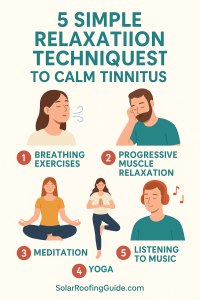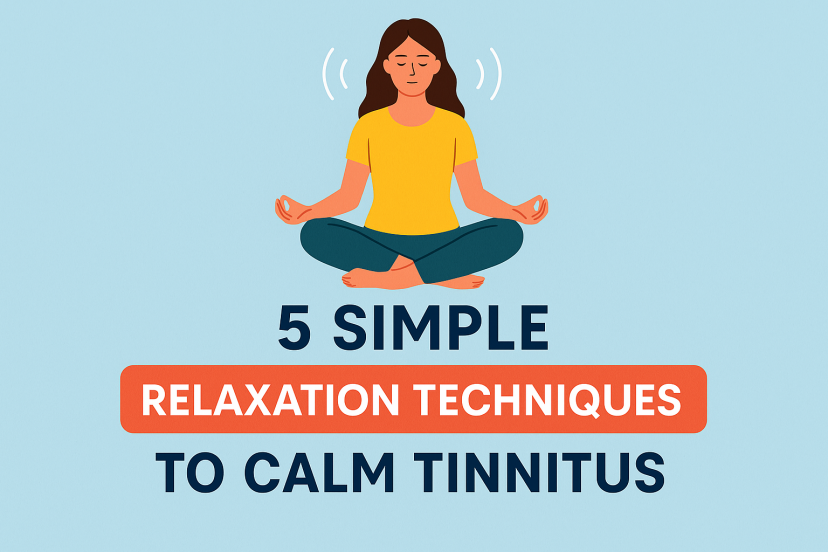5 Simple Relaxation Techniques to Calm Tinnitus Naturally
🔊 Living With Tinnitus: Why Relaxation Matters
If you live with tinnitus — that constant ringing, buzzing, hissing, or whooshing in your ears — you know how exhausting it can be. The noise never stops, and the more you focus on it, the louder it seems to get. Many sufferers describe it as mentally draining and emotionally overwhelming. But here’s the good news: you can retrain your brain to respond differently. By using relaxation for tinnitus, you can lower stress hormones, reduce the brain’s attention to the sound, and finally reclaim a sense of calm.
In this guide, we’ll explore five simple, science-backed relaxation techniques that help quiet the noise, calm your nervous system, and improve your daily life.
🌿 1. Deep Breathing Exercises — Your Natural Stress Reset
When tinnitus spikes, your body’s stress response goes into overdrive. Deep breathing reverses this by activating the parasympathetic nervous system, which tells your body, “You’re safe.”
🫁 How to Practice Relaxed Breathing
-
Sit comfortably and close your eyes.
-
Inhale slowly through your nose for 4 seconds.
-
Hold your breath for 2 seconds.
-
Exhale gently through your mouth for 6 seconds.
-
Repeat for 5–10 minutes, twice a day.
Over time, this breathing rhythm trains your body to stay relaxed — even when tinnitus flares up.
Bonus Tip: Try pairing deep breathing with soft background sounds like ocean waves or white noise. This “dual relaxation” helps distract your mind from the ringing.
💆♂️ 2. Progressive Muscle Relaxation (PMR) — Release Tension, Reduce the Ringing
Many tinnitus sufferers hold chronic muscle tension in their neck, shoulders, and jaw — areas closely connected to the auditory system. Progressive Muscle Relaxation (PMR) teaches your body how to let go.
🪷 Step-by-Step PMR Routine
-
Find a quiet space and lie down.
-
Starting from your feet, tighten one muscle group at a time for 5 seconds, then release.
-
Move upward — calves, thighs, abdomen, shoulders, face.
-
Pay extra attention to your jaw and neck muscles, as tightness here can make tinnitus seem louder.
This method helps the brain associate relaxation with quiet, making it one of the most effective tools for relaxation for tinnitus.
Why It Works: PMR reduces cortisol (the stress hormone), improves sleep, and promotes better blood flow to the ears.
🧘♀️ 3. Mindfulness Meditation — Train Your Brain to Tune Out the Noise
Mindfulness doesn’t stop tinnitus — it changes your relationship with it. Instead of fighting the ringing, mindfulness teaches acceptance and non-reactivity.
🕯️ How to Practice Mindful Awareness
-
Sit in a quiet room and focus on your breathing or the feeling of your body on the chair.
-
When you notice the ringing, acknowledge it: “That’s just a sound my brain is making.”
-
Gently bring your attention back to the present moment.
At first, this may feel impossible — but with daily practice, your brain learns to de-prioritize tinnitus as background noise.
📱 Helpful Tools: Try free mindfulness apps like Calm, Insight Timer, or Headspace, which include guided sessions for tinnitus and sleep.
🎶 4. Sound Therapy & White Noise — Mask and Relax
Silence often makes tinnitus louder. That’s why sound therapy is one of the most recommended techniques for relief. By introducing gentle, consistent background sound, you help your brain stop fixating on the ringing.
🔊 Sound Options for Tinnitus Relief
-
White noise machines: Produce soothing, consistent tones to mask ringing.
-
Nature sounds: Ocean waves, rain, or wind can create a relaxing soundscape.
-
Tinnitus relief apps: Apps like ReSound Relief, myNoise, or Tinnitus Sound Therapy offer customizable masking tracks.
-
Hearing aids with built-in sound generators: Ideal for those with hearing loss and tinnitus.
Pro Tip: Set your sound just below your tinnitus level — the goal is not to drown it out, but to blend it into the background.
💤 5. Guided Visualization — Calm the Mind, Rebalance the Body
Guided visualization combines imagination and relaxation to help you detach from tinnitus-related stress. It’s like taking a mini-vacation for your mind.
🌅 Try This Simple Visualization
-
Close your eyes and imagine a peaceful scene — a quiet beach, mountain cabin, or forest stream.
-
Picture yourself hearing the soft sounds of nature instead of ringing.
-
Breathe deeply, allowing each exhale to release tension.
-
Spend at least 10 minutes “living” in this calm place.
Many U.S. audiology clinics now include visualization training as part of tinnitus retraining therapy (TRT) because it helps rewire emotional responses to sound.
🧩 Lifestyle Tips to Support Relaxation and Tinnitus Relief
While these techniques calm your nervous system, your daily habits also play a big role in how loud or quiet tinnitus feels.
✅ Eat anti-inflammatory foods: Omega-3s, leafy greens, and magnesium-rich foods can improve ear health.
☕ Limit caffeine and alcohol: Both can spike anxiety and tinnitus volume.
🚶 Stay active: Gentle exercise (yoga, walking) boosts circulation and lowers stress.
😴 Prioritize quality sleep: Poor sleep can make tinnitus louder; consider a consistent bedtime routine.
📵 Take “quiet breaks” from technology: Constant digital noise keeps the brain overstimulated.
🩺 When to See a Doctor
While relaxation for tinnitus can bring significant relief, it’s crucial to get a medical evaluation if:
-
Your tinnitus starts suddenly or in one ear only
-
You have dizziness, vertigo, or hearing loss
-
You experience ear pain, drainage, or pressure
-
The sound pulses with your heartbeat (pulsatile tinnitus)
-
Tinnitus interferes with your ability to work, sleep, or function daily
Consult an ENT (Ear, Nose & Throat specialist) or an audiologist. They can check for treatable causes like earwax, infection, or high blood pressure, and suggest advanced options such as tinnitus retraining therapy (TRT) or cognitive behavioral therapy (CBT).
❓ Frequently Asked Questions (FAQs)
1. What is the best relaxation technique for tinnitus?
Mindfulness meditation and deep breathing are two of the most effective relaxation techniques for tinnitus because they reduce stress and shift brain focus away from the ringing.
2. How long does it take to see results from relaxation exercises?
Most people notice improvement after 2–4 weeks of consistent daily practice. The key is repetition and patience.
3. Can relaxation completely cure tinnitus?
No — relaxation doesn’t cure tinnitus, but it can greatly reduce its impact and help you feel more in control of your response to the sound.
4. Is sound therapy safe to use while sleeping?
Yes. Using white noise or nature sounds at a low volume can help mask tinnitus and improve sleep quality.
5. Does anxiety make tinnitus worse?
Absolutely. Anxiety heightens sensitivity to noise. Managing stress through relaxation can lower perceived tinnitus volume.
6. What time of day is best for relaxation for tinnitus?
Morning and evening sessions work best. Doing it before bed helps you fall asleep faster and wake up calmer.
7. Should I combine relaxation with medical treatment?
Yes. Relaxation works best alongside medical evaluation, sound therapy, or hearing support devices recommended by your doctor.
🌅 Conclusion: Take Back Control of Your Quiet
Tinnitus can feel relentless, but it doesn’t have to control your life. By practicing relaxation for tinnitus — through deep breathing, mindfulness, muscle relaxation, visualization, and sound therapy — you train your mind and body to respond calmly instead of reacting with stress.
Start small: 10 minutes a day can make a world of difference. Over time, you’ll find moments of peace that once felt impossible.
🧘 Quiet begins within — and your calm mind is the most powerful sound therapy of all.
⚠️ Disclaimer
This article is for informational purposes only and is not a substitute for professional medical advice, diagnosis, or treatment. Always consult a licensed healthcare provider or audiologist before starting any new therapy or making health-related decisions.

- How to Sleep Better With Tinnitus
- How to Stop High-Pitched Ringing in Ears
- Neck Exercises for Tinnitus Relief






